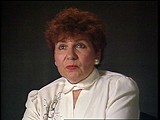You searched for: ghettos
<< Previous | Displaying results 1191-1200 of 1236 for "ghettos" | Next >>
-
Fred Bachner describes flight to eastern Poland upon the German invasion of Poland in September 1939
Oral HistoryFred was born to Polish Jewish parents in Berlin, where his father owned a factory. After the Kristallnacht ("Night of Broken Glass") pogrom in November 1938, Fred's father and brother were deported to Poland. It was not until June 1939, when Poland allowed Fred and his mother to enter the country, that the family was reunited in Krakow. Fred and his family tried to flee upon the German invasion of Poland in September 1939 but were told to return to their homes. They were forced into the Krakow ghetto, and…

-
Bart Stern describes the role of friendships in survival at Auschwitz
Oral HistoryFollowing the German occupation of Hungary in March 1944, Bart was forced into a ghetto established in his home town. From May to July 1944, the Germans deported Jews from Hungary to the Auschwitz killing center in occupied Poland. Bart was deported by cattle car to Auschwitz. At Auschwitz, he was selected to perform forced labor, drilling and digging in a coal mine. As Soviet forces advanced toward the Auschwitz camp in January 1945, the Germans forced most of the prisoners on a death march out of the…
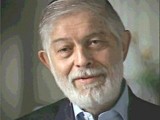
-
Cecilie Klein-Pollack describes survival with her sister in Auschwitz
Oral HistoryCecilie was the youngest of six children born to a religious, middle-class Jewish family. In 1939, Hungary occupied Cecilie's area of Czechoslovakia. Members of her family were imprisoned. The Germans occupied Hungary in 1944. Cecilie and her family had to move into a ghetto in Huszt and were later deported to Auschwitz. Cecilie and her sister were chosen for forced labor; the rest of her family was gassed upon arrival. Cecilie was transferred to several other camps, where she labored in factories. Allied…
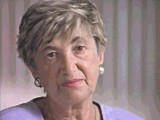
-
Cecilie Klein-Pollack describes mother's actions to save Cecilie's sister's life upon arrival at Auschwitz
Oral HistoryCecilie was the youngest of six children born to a religious, middle-class Jewish family. In 1939, Hungary occupied Cecilie's area of Czechoslovakia. Members of her family were imprisoned. The Germans occupied Hungary in 1944. Cecilie and her family had to move into a ghetto in Huszt and were later deported to Auschwitz. Cecilie and her sister were chosen for forced labor; the rest of her family was gassed upon arrival. Cecilie was transferred to several other camps, where she labored in factories. Allied…
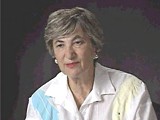
-
Cecilie Klein-Pollack describes arrival at Auschwitz
Oral HistoryCecilie was the youngest of six children born to a religious, middle-class Jewish family. In 1939, Hungary occupied Cecilie's area of Czechoslovakia. Members of her family were imprisoned. The Germans occupied Hungary in 1944. Cecilie and her family had to move into a ghetto in Huszt and were later deported to Auschwitz. Cecilie and her sister were chosen for forced labor; the rest of her family was gassed upon arrival. Cecilie was transferred to several other camps, where she labored in factories. Allied…
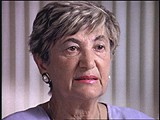
-
Judith Meisel describes arrival at the Stutthof camp
Oral HistoryUpon her father's death, Judith and her family moved to Kovno. Soon, they were confined to the ghetto, which the Germans formed in 1941. Judith, her mother and sister were deported to Stutthof, where her mother died. Judith and her sister escaped from a death march out of Stutthof. They posed as non-Jews, found farm work and eventual refuge in Denmark. Their brother survived Dachau.
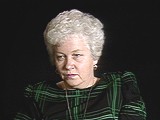
-
Hana Mueller Bruml describes her deportation to and arrival at Theresienstadt
Oral HistoryIn 1942, Hana was confined with other Jews to the Theresienstadt ghetto, where she worked as a nurse. There, amid epidemics and poverty, residents held operas, debates, and poetry readings. In 1944, she was deported to Auschwitz. After a month there, she was sent to Sackisch, a Gross-Rosen subcamp, where she made airplane parts at forced labor. She was liberated in May 1945.
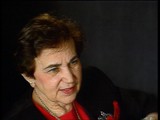
-
Sophie Turner-Zaretsky describes her years in Poland living under a false identity
Oral HistorySophie was born Selma Schwarzwald to parents Daniel and Laura in the industrial city of Lvov, two years before Germany invaded Poland. Daniel was a successful businessman who exported timber and Laura had studied economics. The Germans occupied Lvov in 1941. After her father's disappearance on her fifth birthday in 1941, Sophie and her mother procured false names and papers and moved to a small town called Busko-Zdroj. They became practicing Catholics to hide their identities. Sophie gradually forgot that…
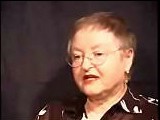
-
Gerda Haas describes postwar reunion with her father in the United States
Oral HistoryGerda was raised in a religious family in the small town of Ansbach, Germany, where her father was the Jewish butcher. She attended German schools until 1936, and then moved to Berlin to attend a Jewish school. She returned to her hometown after Kristallnacht in November 1938. Her family was then ordered to move to Munich, and in July 1939 her father left for England and then the United States. He was unable to arrange for the rest of his family to join him. Gerda moved to Berlin in 1939 to study nursing.…
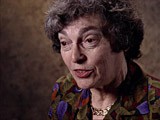
-
Frima L. describes roundup of Jews for mobile killing unit (Einsatzgruppen) massacre
Oral HistoryWhile Frima's family was confined to a ghetto, Nazis used her father as an interpreter. He later perished. By pretending not to be Jews, Frima, her mother, and sister escaped a German mobile killing unit massacre. They were later discovered and jailed. Again, her mother devised an escape. Frima's mother and sister were smuggled to Romania, while Frima wandered in search of safekeeping until her mother could arrange to smuggle her out. In Romania, they were reunited and liberated.
